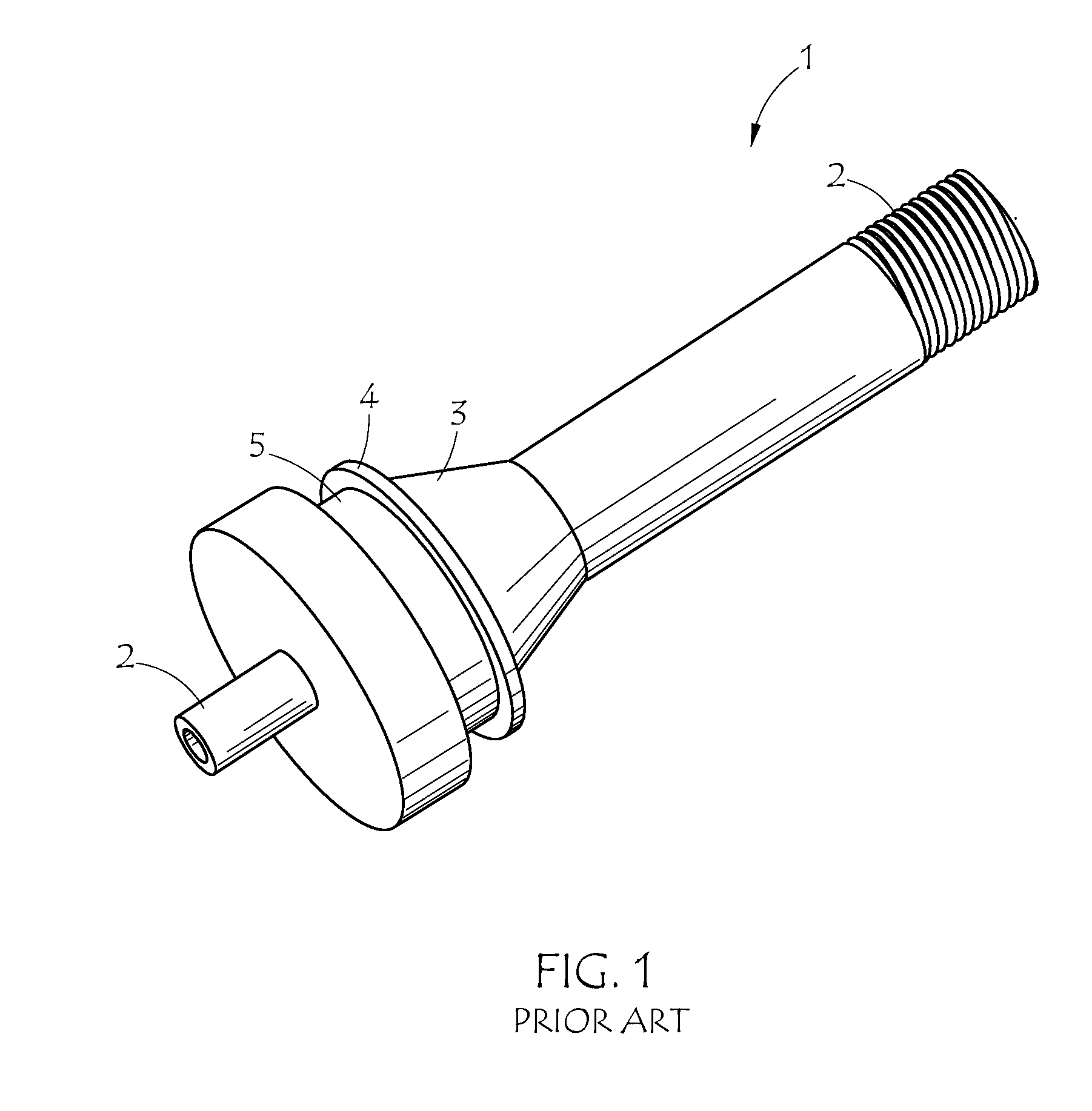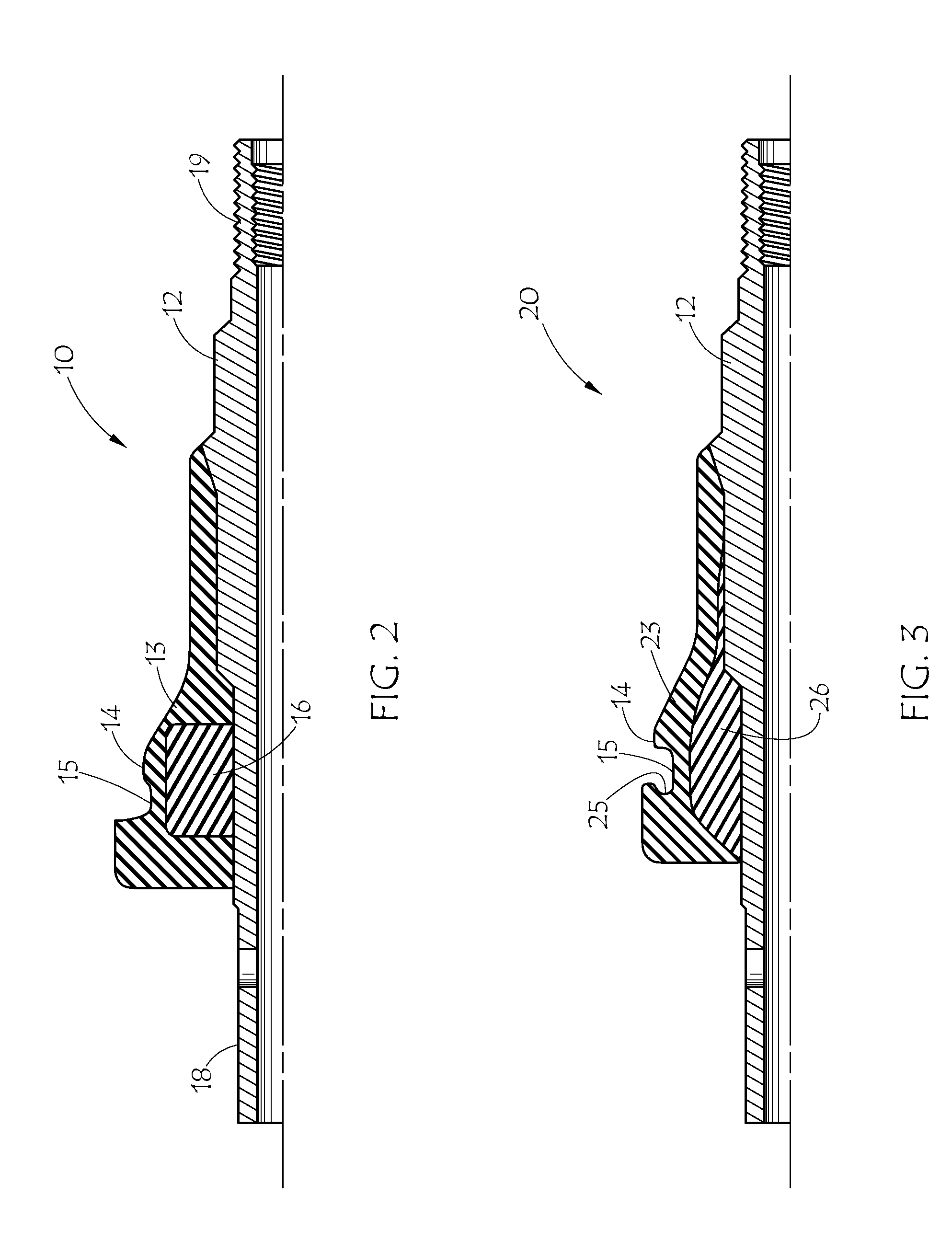Rubber composition and design for snap-in tire valve
- Summary
- Abstract
- Description
- Claims
- Application Information
AI Technical Summary
Benefits of technology
Problems solved by technology
Method used
Image
Examples
example 2
[0054]A series of tire valves having relatively soft rubber compositions according to the first embodiment described herein were prepared and designated Ex. 2 in Table 1. The compositions were based on EPM elastomer (Vistalon 706, available under that trademark from ExxonMobile Chemical). Carbon black ranged from 40 to 56 PHR. Paraffinic oil ranged from 37 to 46 PHR. One of ZDMA and ZDA were added at 5 to 10 PHR as the metal adhesive coagent. The high-density inert filler was 20 PHR of barium sulfate. The composition also included 1 PHR of antioxidant and 0.3 PHR of scorch retarder, and the cure system was 9 to 11 PHR of peroxide (generally 40% active on clay). The rubber physical properties for this series exhibited about 150-175° C. maximum use temperature, Shore A rubber hardness in the range of 53 to 58, tensile strength in the range of 1500-2800 psi (10-19.3 MPa), elongation at break in the range of 460-650%, S100 in the range of 270-380 psi (1.9-2.6 MPa), and calculated densit...
example 3
[0055]A second series of inventive tire valves having rubber of medium hardness compositions according to the first embodiment described herein were prepared and the results designated Ex. 3 in Table 1. The compositions were based on EPM elastomer (Vistalon 706, available under that trademark from Exxon-Mobile). Carbon black ranged from 40 to 60 PHR. Paraffinic oil ranged from 23 to 31 PHR. One of ZDMA and ZDA were added at 5 to 10 PHR as the metal adhesive coagent. The high-density inert filler was 20 PHR of barium sulfate. The composition also included 1 PHR of antioxidant and 0.3 PHR of scorch retarder, and the cure system was 8 to 9 PHR of peroxide (generally 40% active on clay). The rubber physical properties for this series exhibited about 150-175° C. maximum use temperature, Shore A rubber hardness in the range of 59 to 62, tensile strength in the range of 2100-2400 psi (14.5-16.5 MPa), elongation at break in the range of 350-400%, S100 in the range of 438-500 psi (3.0-3.4 MP...
example 4
[0056]A third series of a relatively hard rubber composition according to the first embodiment described herein was prepared. The composition was based on EPM elastomer (Vistalon 706, available under that trademark from Exxon-Mobile). The level of carbon black was 60 PHR, paraffinic oil was 20 PHR, and ZDA was added at 10 PHR as the metal adhesive coagent. The high-density inert filler was 20 PHR of barium sulfate. The composition also included 1 PHR of antioxidant and 0.3 PHR of scorch retarder, and the cure system was 5 PHR of peroxide (generally 40% active on clay). The rubber physical properties for this series (Ex. 4) exhibited about 150-175° C. maximum use temperature, Shore A rubber hardness of about 74, tensile strength of about 2500 psi (17 MPa), elongation at break of about 290%, S100 of about 770 psi (5.3 MPa), and calculated density of about 1.15 g / cc. Thus, rubber hardness and S100 modulus indicates a composition significantly harder than the conventional compound of Co...
PUM
| Property | Measurement | Unit |
|---|---|---|
| Fraction | aaaaa | aaaaa |
| Fraction | aaaaa | aaaaa |
| Weight | aaaaa | aaaaa |
Abstract
Description
Claims
Application Information
 Login to View More
Login to View More - R&D
- Intellectual Property
- Life Sciences
- Materials
- Tech Scout
- Unparalleled Data Quality
- Higher Quality Content
- 60% Fewer Hallucinations
Browse by: Latest US Patents, China's latest patents, Technical Efficacy Thesaurus, Application Domain, Technology Topic, Popular Technical Reports.
© 2025 PatSnap. All rights reserved.Legal|Privacy policy|Modern Slavery Act Transparency Statement|Sitemap|About US| Contact US: help@patsnap.com



